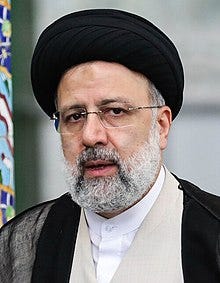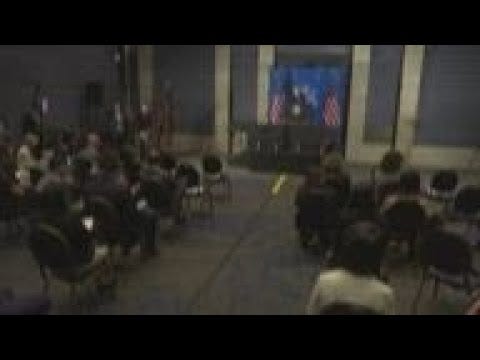Nuke Deal Remains 'First Goal' For Biden, Despite Election of Iranian Hardliner
Seventh round of talks to restore Obama-era agreement expected to begin soon
Iran will soon usher in a new president — conservative hardliner Ebrahim Raisi — but the Biden administration remains hopeful that it can reinstate the 2015 deal to contain Iran's nuclear ambitions which former president Donald Trump scuttled during his term of office.
Assuming office in August, Raisi was a conservative judge and has been a staunch critic of the West before he won Friday's presidential election — an election marked by extremely low turnout and widely seen as rigged in Raisi's favor.
“Americans broke their promise and Europeans also did not meet their commitment,” Raisi said through a translator in a CNN interview. “So we are stressing to the U.S. administration when it comes to its commitment within this deal that the U.S. needs to adhere to that and act accordingly. Regional issues or ballistic issues are not negotiable.”
Still, the US government has reason to hope that talks — which have been ongoing and indirect, between Iran and US allies since Biden's taken office — will be ultimately successful in bringing about Iran's reentry into the so-called Joint Comprehensive Plan of Action or JCPOA.

Originally negotiated under the auspices of the Obama-Biden and the so-called P5+1 — the five permanent members of the United Nations Security Council plus Germany — as well as the European Union, the international community agreed that the agreement was working well to contain Iran's ambitions to develop nuclear weapons.
However, Trump never supported the deal and formally withdrew the United States from the agreement in 2018.
With the support of most US allies, President Biden now is eager to put it back together.
The sixth round of indirect talks just broke up, with a seventh expected to get started in Vienna, Austria, shortly, according to State Department spokesman Ned Price.
“When it comes to Iran, what I would say is that we will continue discussions with our allies and partners on what we’ve been aiming for this entire time, and that, of course, is a mutual return to compliance with the Joint Comprehensive Plan of Action or JCPOA. As you know, the sixth round of Vienna talks adjourned on Sunday and delegations are returning to their respective capitals for consultations. That includes special envoy for Iran Rob Malley and the delegation. I understand that Rob is currently in transit back to the United States,” Price said. “The timing for the seventh round has not yet been announced, but I would expect the team will return to Vienna in advance of that.
“Look, the broader point is that our Iran policy is designed to advance U.S. interests, and that is regardless of who is chosen as Iran’s president in a process that we consider to be pre-manufactured. This was not a free and fair election process in which Iranians were denied their right to choose their own leaders,” he added. “And when it comes to our diplomacy, we’ve always said that it is absolutely in our interests to arrive at a mutual return to compliance with the JCPOA precisely because it would allow us to once again permanently and verifiably prevent Iran from obtaining a nuclear weapon. That was in our interests before the Iranian election. It is manifestly in our interests after the election.”
Particularly, although it maintains a president, it's Iran’s supreme leader who determines Iran’s “policy on a range of important issues,” Price noted.
That supreme leader is Ali Khamenei, and indeed, is the individual largely seen as fixing last week's election for Raisi.
“Iran will have, we expect, the same supreme leader in August as it will have today, as it had before the elections, as it had in 2015 when the JCPOA was consummated for the first time,” Price said.
“Permanently and verifiably”
As crucial as reestablishing the nuclear deal is, it's also important that the United States do so in concert with its allies, and view it as an opening to engage with Iran on other issues, according to Price.
“So President Biden, even before he was inaugurated as president, has held that his first goal is to return to a mutual compliance with the JCPOA, chiefly for the reason I was alluding to, because it is a means to permanently and verifiably prevent Iran from obtaining a nuclear weapon. It is a means to verifiably ensure that Iran’s nuclear program is no longer galloping forward in ways that we have seen it during the course of the last administration and since Iran has distanced itself from the nuclear deal in recent years,” the spokesman said.
“As we’ve said, every challenge we face with Iran becomes more difficult if Iran’s nuclear program is unconstrained and if Iran is able to become closer and closer to the breakout point that would allow it to build a nuclear weapon should it choose to do so in short order,” he added. “But the president has also been clear that with the return to mutual compliance he would seek to address those other areas of concern, including Iran’s ballistic missile development and proliferation and its support for terrorist groups and proxies throughout the region with follow-on diplomacy.
"And we are consulting closely with our allies, with our partners in the region, on ways to address this going forward. It’s very important to us that our partners in the region be a part of this,” Price said.



